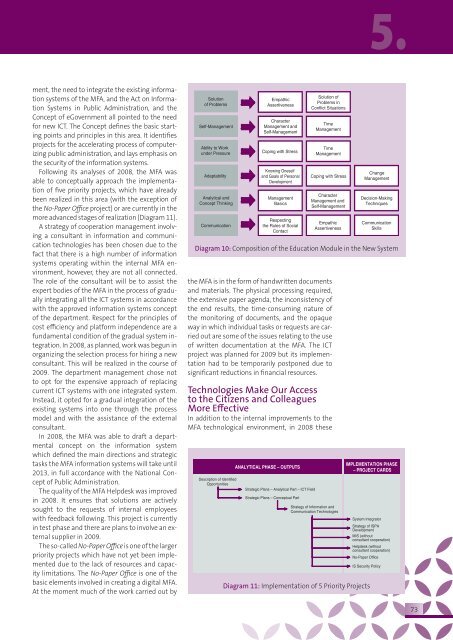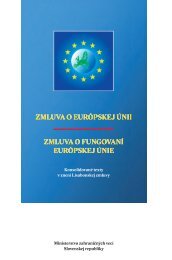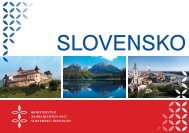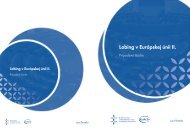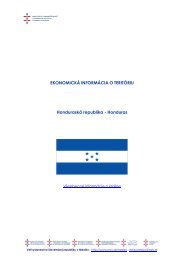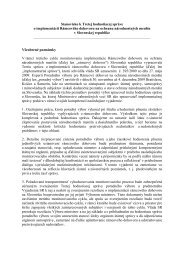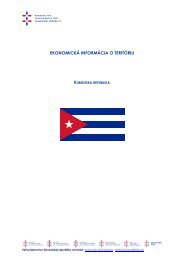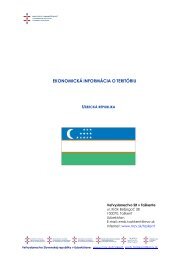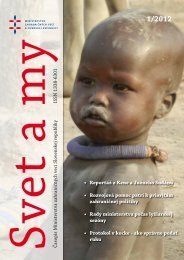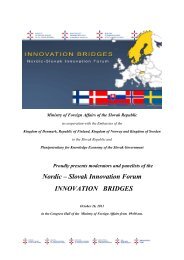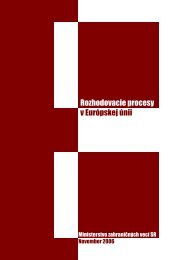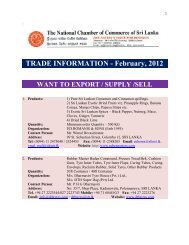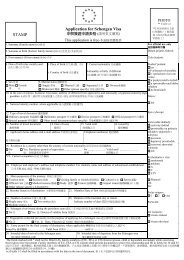Annual Report Ministry of Foreign Affairs of the Slovak Republic 2008
Annual Report Ministry of Foreign Affairs of the Slovak Republic 2008
Annual Report Ministry of Foreign Affairs of the Slovak Republic 2008
Create successful ePaper yourself
Turn your PDF publications into a flip-book with our unique Google optimized e-Paper software.
5.<br />
ment, <strong>the</strong> need to integrate <strong>the</strong> existing information<br />
systems <strong>of</strong> <strong>the</strong> MFA, and <strong>the</strong> Act on Information<br />
Systems in Public Administration, and <strong>the</strong><br />
Concept <strong>of</strong> eGovernment all pointed to <strong>the</strong> need<br />
for new ICT. The Concept defines <strong>the</strong> basic starting<br />
points and principles in this area. It identifies<br />
projects for <strong>the</strong> accelerating process <strong>of</strong> computerizing<br />
public administration, and lays emphasis on<br />
<strong>the</strong> security <strong>of</strong> <strong>the</strong> information systems.<br />
Following its analyses <strong>of</strong> <strong>2008</strong>, <strong>the</strong> MFA was<br />
able to conceptually approach <strong>the</strong> implementation<br />
<strong>of</strong> five priority projects, which have already<br />
been realized in this area (with <strong>the</strong> exception <strong>of</strong><br />
<strong>the</strong> No-Paper Office project) or are currently in <strong>the</strong><br />
more advanced stages <strong>of</strong> realization (Diagram 11).<br />
A strategy <strong>of</strong> cooperation management involving<br />
a consultant in information and communication<br />
technologies has been chosen due to <strong>the</strong><br />
fact that <strong>the</strong>re is a high number <strong>of</strong> information<br />
systems operating within <strong>the</strong> internal MFA environment,<br />
however, <strong>the</strong>y are not all connected.<br />
The role <strong>of</strong> <strong>the</strong> consultant will be to assist <strong>the</strong><br />
expert bodies <strong>of</strong> <strong>the</strong> MFA in <strong>the</strong> process <strong>of</strong> gradually<br />
integrating all <strong>the</strong> ICT systems in accordance<br />
with <strong>the</strong> approved information systems concept<br />
<strong>of</strong> <strong>the</strong> department. Respect for <strong>the</strong> principles <strong>of</strong><br />
cost efficiency and platform independence are a<br />
fundamental condition <strong>of</strong> <strong>the</strong> gradual system integration.<br />
In <strong>2008</strong>, as planned, work was begun in<br />
organizing <strong>the</strong> selection process for hiring a new<br />
consultant. This will be realized in <strong>the</strong> course <strong>of</strong><br />
2009. The department management chose not<br />
to opt for <strong>the</strong> expensive approach <strong>of</strong> replacing<br />
current ICT systems with one integrated system.<br />
Instead, it opted for a gradual integration <strong>of</strong> <strong>the</strong><br />
existing systems into one through <strong>the</strong> process<br />
model and with <strong>the</strong> assistance <strong>of</strong> <strong>the</strong> external<br />
consultant.<br />
In <strong>2008</strong>, <strong>the</strong> MFA was able to draft a departmental<br />
concept on <strong>the</strong> information system<br />
which defined <strong>the</strong> main directions and strategic<br />
tasks <strong>the</strong> MFA information systems will take until<br />
2013, in full accordance with <strong>the</strong> National Concept<br />
<strong>of</strong> Public Administration.<br />
The quality <strong>of</strong> <strong>the</strong> MFA Helpdesk was improved<br />
in <strong>2008</strong>. It ensures that solutions are actively<br />
sought to <strong>the</strong> requests <strong>of</strong> internal employees<br />
with feedback following. This project is currently<br />
in test phase and <strong>the</strong>re are plans to involve an external<br />
supplier in 2009.<br />
The so-called No-Paper Office is one <strong>of</strong> <strong>the</strong> larger<br />
priority projects which have not yet been implemented<br />
due to <strong>the</strong> lack <strong>of</strong> resources and capacity<br />
limitations. The No-Paper Office is one <strong>of</strong> <strong>the</strong><br />
basic elements involved in creating a digital MFA.<br />
At <strong>the</strong> moment much <strong>of</strong> <strong>the</strong> work carried out by<br />
Solution<br />
<strong>of</strong> Problems<br />
Self-Management<br />
Ability to Work<br />
under Pressure<br />
Adaptability<br />
Analytical and<br />
Concept Thinking<br />
Communication<br />
Empathic<br />
Assertiveness<br />
Character<br />
Management and<br />
Self-Management<br />
Coping with Stress<br />
Knowing Oneself<br />
and Goals <strong>of</strong> Personal<br />
Development<br />
Management<br />
Basics<br />
Respecting<br />
<strong>the</strong> Rules <strong>of</strong> Social<br />
Contact<br />
Solution <strong>of</strong><br />
Problems in<br />
Conflict Situations<br />
Time<br />
Management<br />
Time<br />
Management<br />
Coping with Stress<br />
Character<br />
Management and<br />
Self-Management<br />
Empathic<br />
Assertiveness<br />
Diagram 10: Composition <strong>of</strong> <strong>the</strong> Education Module in <strong>the</strong> New System<br />
<strong>the</strong> MFA is in <strong>the</strong> form <strong>of</strong> handwritten documents<br />
and materials. The physical processing required,<br />
<strong>the</strong> extensive paper agenda, <strong>the</strong> inconsistency <strong>of</strong><br />
<strong>the</strong> end results, <strong>the</strong> time-consuming nature <strong>of</strong><br />
<strong>the</strong> monitoring <strong>of</strong> documents, and <strong>the</strong> opaque<br />
way in which individual tasks or requests are carried<br />
out are some <strong>of</strong> <strong>the</strong> issues relating to <strong>the</strong> use<br />
<strong>of</strong> written documentation at <strong>the</strong> MFA. The ICT<br />
project was planned for 2009 but its implementation<br />
had to be temporarily postponed due to<br />
significant reductions in financial resources.<br />
Technologies Make Our Access<br />
to <strong>the</strong> Citizens and Colleagues<br />
More Effective<br />
In addition to <strong>the</strong> internal improvements to <strong>the</strong><br />
MFA technological environment, in <strong>2008</strong> <strong>the</strong>se<br />
Description <strong>of</strong> Identified<br />
Opportunities<br />
ANALYTICAL PHASE – OUTPUTS<br />
Strategic Plans – Analytical Part – ICT Field<br />
Strategic Plans – Conceptual Part<br />
Strategy <strong>of</strong> Information and<br />
Communication Technologies<br />
Diagram 11: Implementation <strong>of</strong> 5 Priority Projects<br />
Change<br />
Management<br />
Decision-Making<br />
Techniques<br />
Communication<br />
Skills<br />
IMPLEMENTATION PHASE<br />
– PROJECT CARDS<br />
System Integrator<br />
Strategy <strong>of</strong> ISPA<br />
Development<br />
MIS (without<br />
consultant cooperation)<br />
Helpdesk (without<br />
consultant cooperation)<br />
No-Paper Office<br />
IS Security Policy<br />
73


